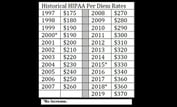A team of actuaries at Milliman says 577 Medicare Advantage plans are now providing at least one benefit that’s similar to the type of benefit a long-term care insurance policy might offer.
The most popular “long-term care type benefit” is for support for caregivers: 421 plans offer caregiver hotlines, respite services or other caregiver support benefits.
The most unusual LTC type benefits are benefits for housekeeping and therapeutic massage. Just one plan offers either of those benefits, the actuaries found.
(Related: 4 Top Medicare Advantage Mini LTC Benefits)
Some of the other LTC type benefits offered by at least a few plans include backup support for medical equipment, access to personal home care, and access to a “wandering support services.” Wandering support services help caregivers with loved ones who have dementia, are unable to go out alone safely, and may try to go out on their own.
The Milliman team found that the counties with the highest level of access to LTC type benefits per Medicare Advantage enrollee are mostly in Arkansas, Montana, Missouri and Texas.
The actuaries have published those findings in a new report based on an analysis of data from the Centers for Medicare and Medicaid Services (CMS), the federal agency that runs the Medicare Advantage program.
The program gives health insurers a chance to provide coverage that serves as an alternative to traditional Medicare program coverage.
Medicare Advantage LTC Type Benefits
Traditionally, Medicaid has covered nursing home care for poor people and other people who qualify for Medicaid nursing home benefits under state and federal eligibility rules.
Medicare has provided some home medical care and skilled nursing facility care for people who were recovering from acute health care problems, but it has declined to provide skilled nursing care for people who are not getting better, and it has not provided support services unrelated to health care.
CMS has let Medicare Advantage issuers slip extra support services into special needs plans, and it has let the Medicare program participate in “soup to nuts” pilot programs for people who qualify for both Medicare and Medicaid.









 February 15, 2019 at 01:21 PM
February 15, 2019 at 01:21 PM











